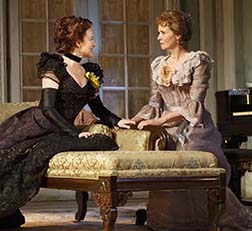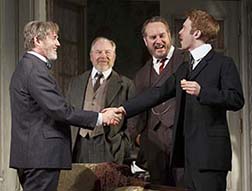
Lucy
Komisar
| “The Little Foxes.”
“The Little Foxes.” Lillian Hellman’s 1939 play is a family battle where the antagonists are class and gender. The title comes from the Song of Solomon in the King James Bible: “Take [from] us the foxes, the little foxes, that spoil the vines: for our vines have tender grapes.” The Manhattan Theatre Club, under the direction of Daniel Sullivan, gives it a stunning production.
The place is a small Alabama town in 1900. The little foxes are the members of the Hubbard family of shopkeepers who lust after the pedigree and money of the cotton aristocrats. They attempt to move up the social and economic ladder through marriage, one to the naïve daughter of a plantation owner, the other to a banker. They will indeed spoil what they touch. The brothers Oscar (Darren Goldstein, good as the immoral climber) and Ben Hubbard (Michael McKean, who shows a man who willingly goes along) are anxious to get a Chicago investor, Mr. Marshall (David Alford) to partner with them in a cotton mill. The mill will make them a lot of money and also get them closer to the cotton aristocracy. They are on the same page as Marshall. He wants cheap labor. “Play them off against each other, make them hate each other.” He means blacks and whites. There are no strikes as in Massachusetts. That sits fine with the Hubbards, whose store makes money by cheating “nigras.”
The Hubbards have contempt for the aristocratic planters who were too “high-toned” to adapt. Brother Ben declares, “We took over their land, and their cotton and their daughter.” That would be Oscar’s wife Birdie (the very subtle and sensitive Cynthia Nixon), the naïve daughter of a planter. In Hellman’s story, these strivers are crude and nasty, to their spouses and to each other. Director Sullivan makes it clear they are mercantile thieves. Marshall wants a $75,000 investment, and the brothers don’t have it. Their sister Regina (a brilliant Laura Linney) didn’t get any money from the family – that went to the boys. But she has a rich husband Horace Giddens (an avuncular Richard Thomas).
Events take place in the drawing room of their home, with double doors with pediments, befitting a genteel southern elegance. Horace has been at John Hopkins hospital in Baltimore recovering from a heart condition and also getting some peace away from his predatory wife. Linney show Regina as a sophisticated manipulator. Horace was away for five months, and she never visited. Regina gets their daughter Alexandra (Francesca Carpanini) to take the train to Baltimore to tell him how much his wife misses him and to bring him back. He has $88,000 in railroad bonds stashed in a bank safe deposit box. She needs him to invest in the mill. She is already dreaming of how to spend it – and it doesn’t involve saying in Alabama. Showing the moral opposite, Birdie, whose grandfather was governor, is shy giddy, giggly, with a high-pitched voice that speaks timidity. She is the real aristocrat. She married Oscar because he was nice to her. Now he hits her, and she drinks. Nixon is a superb Birdie, distraught, frightened, even slightly understated as if she didn’t want to take up too much space. In this play, even though the men have the power, they are almost caricatures. The most interesting figures are the women, portrayed by Linney and Nixon in unforgettable fashion.
When Thomas returns, Regina accuses him of having had fancy women, but it turns out she hadn’t slept with him for ten years. She wants him to invest the money they need, but he won’t. Cruel and hard, she turns on him. Contemptuous, she taunts him that she married him for money. Linney erupts as a furious harridan. Meanwhile, Oscar’s nasty nitwit son Leo (Michael Benz) who works at the bank, volunteers to his father that he has seen the bonds. We can predict what happens next, but not what happens after that. Hellman is a masterful story-teller. Horace’s clever deus ex machina is that with the $88G bonds, that he knows have been stolen, he will have his revenge. He won’t survive Regina’s duplicity, but will have the Hubbards destroy each other with the help of a little blackmail. In that family, the knives are out all around. And as his condition worsens, only his daughter cares. Ben comments: “There are hundreds of Hubbards sitting in rooms like this throughout the country. All their names aren’t Hubbard, but they are all Hubbards and they will own this country some day.” The play is Hellman’s prescient comment on corrupt capitalism.
|
| museums | NYTW mail | recordings | coupons | publications | classified |



